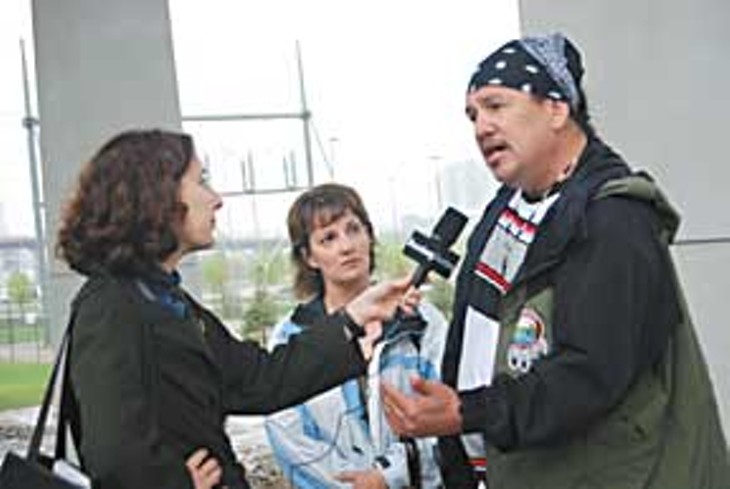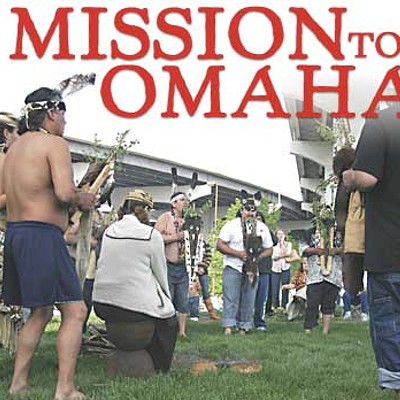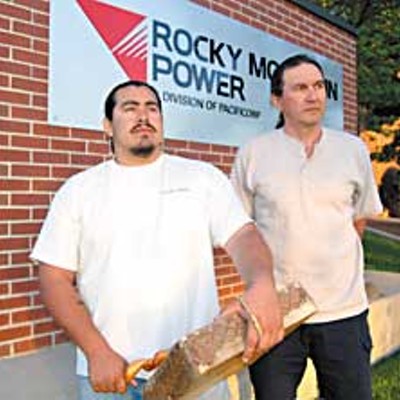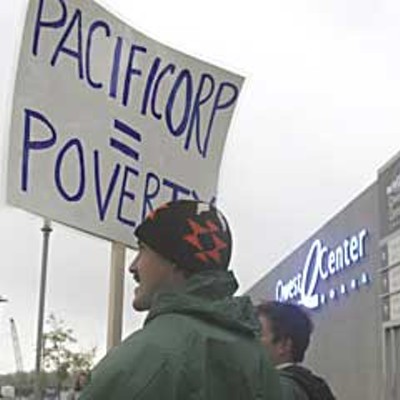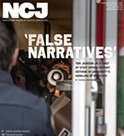[
{
"name": "Top Stories Video Pair",
"insertPoint": "7",
"component": "17087298",
"parentWrapperClass": "fdn-ads-inline-content-block",
"requiredCountToDisplay": "1"
}
]
Dressed in traditional regalia, with woven baskets on their heads and earthy symbols of renewal in hand, about 20 Native Americans chanted, danced and prayed in a circle. They surrounded Karuk tribe member Kathy McCovey, a medicine woman, sitting next to a fire burning angelica root, her eyes closed, meditating. Their shell-encased skirts made the sound of water.
The Klamath River Basin coalition - a group of Native Americans, commercial fisherman and conservationists - had arrived in Omaha Thursday, May 3, for a salmon cookoff at Heartland of America Park. The next day at the same spot under the Interstate 480 bridge, the natives demonstrated the aforementioned "brush ceremony," an ancient, healing ritual.
Omaha tribe elder Richard Barea, 59, attended the ceremony after hearing about it through word of mouth, or "the moccasin telegraph." A Karuk Tribe member approached him with an offering, a dried salmon stick, similar to jerky. "This is what we're trying to save," he told Barea.
The coalition joined the nearly 30,000 in town for Berkshire Hathaway's annual meeting on May 5. Representatives of the three largest Klamath Indian tribes from the northern California/southern Oregon border - Karuk, Hoopa and Yurok - aimed to educate Berkshire Hathaway shareholders about the destructive impact that the Berkshire/MidAmerican Energy-owned utility PacifiCorp's hydro-powered dams have had on the ecosystem of the Klamath River Basin. The dams have slowed salmon migration to an alarming rate; commercial salmon fishing was banned along 700 miles of California-Oregon coast last year.
Salmon is the lifeline for these people. Two handmade redwood canoes symbolically followed the tribe on the journey from Klamath; in the past nine days they had traveled and demonstrated in San Francisco, Sacramento and Salt Lake City (PacifiCorp's headquarters). Bob McConnell, a Yurok tribal member, fisherman and boat builder explained to a small group the history of the boat's significance. "A boat is considered a person," he said, pointing to its "body parts" - nose, heart, lungs, kidneys.
"The real thing we're here for is to educate the powers that be in Berkshire Hathaway about PacifiCorp," he said. "They are strangling our cultures." The 57-year-old was 13 in 1962 when the last dam was built. Back then, 10,000 salmon might have swam by in a single day, he said. His people used to be able to catch enough fish in one day to feed their families for a year; now they're lucky if they catch three.
As the "brush" ceremony concluded, shareholder passes to the convention were being accounted for in preparation for the big day ahead (some were acquired through shareholder friends, some for $15 on eBay) - asking Warren Buffett, in front of thousands of people, if he's going to do anything about his company that's ruining their culture. After all, his sons, Howard and Peter, are known as Native American advocates. Peter composed music for Dances With Wolves and 500 Nations, an eight-hour CBS documentary about Indian heritage. In fact, Karuk member Leaf Hillman was a finalist two years ago for an American Indian leadership award from the Buffett brothers for his role in this very campaign. Hillman was in Omaha leading the Klamath allies as part of the dam-removal campaign, and is a plaintiff in a pending lawsuit against PacifiCorp. So where were the Buffett brothers this week? Repeated attempts to contact them failed, and a Berkshire spokeswoman said no one was available for interviews. "Personally, I find that [lack of response] offensive," said Karuk coordinator Craig Tucker. "They should be here."
Words of wisdom
People absolutely adore Warren Buffett. Maybe it's because though he's the second-richest man in the world, he'll dedicate five hours to offering advice and answering about 60 questions from shareholders at his annual "Woodstock of Capitalism."
Events ran from Friday through Saturday at Omaha's Qwest Convention Center. There was a pavillion set up to display and market products manufactured by Berkshire Hathaway's many companies. Buffett himself pitched, for a bit: The candid and outspoken 76-year-old Berkshire Hathaway president played the ukulele and sang with the Quebe Sisters Band at the Justin Boots booth, and did the can-can with Fruit of the Loom mascots dressed in tights, all while searching for a successor to handle his more than $40 billion.
It was the face of big business - really big; shareholders from New York to Germany to China to Kuwait to Kansas City combined for a record 27,000 in attendance.
Buffet and his partner Charlie Munger fielded questions and talked shop while shareholders took advantage of discounts in the adjacent convention market. A 17-year-old told the duo that this was his 10th convention. The boy asked his idols what he should do to become an investor, while others asked about intrinsic value, derivatives and other intricate business strategy.
This event was huge, too, for the group of 40 Native Americans, commercial fisherman and conservationists representing the Klamath. It was raining and cold outside the Qwest Center Omaha this Saturday morning as they held up signs: "PacifiCorp = Poverty," "Save Our Native Culture," "Un-dam the Klamath" and "PacifiCorp = Salmon Kill." One sign even catered to terms appropriate of the day: "Dam Removal Good Business."
It'd been a long week for Karuk tribe member Kenneth Brink and the coalition. As he peacefully distributed brochures, an elderly woman flipped him the bird as others smirked or walked by without a glance.
"Most shareholders don't know who PacifiCorp is," Brink said outside the Qwest at about noon after the signs had been packed up. For every 500 passers-by, probably 20 were receptive to the protesters. Some told them to "get a life ... get a job." The advocates were preparing for the culmination of their journey to Nebraska. They came here to ask Buffett some questions. "Warren's going to be our hero," Brink said.
'Bad business'
Craig Tucker's eyes carry heavy baggage; the Karuk spokesman has been doing interviews nonstop. Even CNN called. He's been trying to get the word out about the health and environmental disaster PacifiCorp's dams have created.
Not only have the dams threatened and in some cases caused extinction to indigenous species, they've caused toxic liver-damaging algae blooms at levels nearly 4,000-times higher than World Health Organization guidelines.
Brink said his people - 3,600 Karuks live in the middle Klamath - caught 200 fish for the entire year in 2006. "Our children can't even swim in the river anymore," he added. Federal agencies have noticed: For the past four years PacifiCorp has been trying to secure a 50-year license renewal from the Federal Energy Regulatory Commission (FERC) to operate the dams; the commission mandated PacifiCorp to install fish ladders, estimated to cost between $300-$350 million. Several lawsuits have been filed, including one last week by Yurok and Karuk tribal leaders regarding the algae's toxic hazards.
The four dams the Klamath coalition target produce about 150 megawatts of power, accounting for about 2 percent of the company's electricity, or enough to power 70,000 homes. Tucker said the major liabilities associated with keeping the dams operative more than outweigh their practical application.
"Eventually someone is going to get sick from the algae," Tucker said. PacifiCorp's had chances to resolve the issue, but continues to "drag its feet" and is making "bad business" moves, he said. The Klamath coalition thought Buffett would be interested to hear about it.
PacifiCorp and the parties who support dam removal have been negotiating the issue for quite some time. The Klamath allies traveled to Scotland in 2004 and '05 for similar demonstrations to PacifiCorp's former owner, Scottish Power. Berkshire acquired the utility about a year ago.
"I think the Scottish people were embarrassed of this impact on Native Americans," Tucker said, "and they sold the problem to Warren Buffett."
PacifiCorp spokesman Dave Kvamme said the company would "continue to work through the settlement process. It's our preference to find a settlement outcome." If one cannot be found, the utility would continue to pursue the federal licensing process.
Kvamme said "nobody knows what removal of the dams would cost," but the California Energy Commission and other regulatory agencies have concluded that removing the dams would actually save the utility more than $100 million. Michael Bowen, project manager for the California Coastal Conservancy, said PacifiCorp has offered dam-removal cost estimates as large as $1 billion, with no evidence to support them. Kvamme said the 20-million cubic yards of sediment that lie behind the dams may need to be treated. Bowen's organization conducted a study of the sediment and found it to be non-toxic. "Our assertion is that [dam removal] would cost $100 million," Bowen said, an option much cheaper than installing fish ladders.
Kvamme said the CCC's study was only a "preliminary look."
Tucker's response to Kvamme: "Where's your study?"
Big screen, smoke screen
The day of the convention, the canoes were parked outside the Qwest at 6 a.m.
Many of the tribe members were on the eighth day of a nine-day fast, operating on little to no sleep. Kelly Catlett, a Friends of the River policy advocate from Sacramento, reported that the situation became even more stressful when people on the street started saying nasty things to the protesters.
"They were really hurt by that, given that they came with good hearts and good spirit, and simply wanted to educate and tell people what's happening to them," said Catlett.
Inside the Qwest, the crowd mixed of suits and laymen buzzed with excitement. A group of five Klamath Indian women dressed in full regalia waited in line in the hallway to address the beloved billionaire, long heralded as a man of integrity. Could he be swayed? It was the hope. Finally, after almost seven hours, Ronnie Pellegrini, accompanied by her 14-year-old daughter, explained how her husband, Paul, is a fourth-generation fisherman from Eureka and how the four PacifiCorp hydro dams had resulted in 95 percent salmon loss. She told Buffett this was ruining livelihoods on the Pacific coast. "You are a great businessman who's built an incredible empire," she said. "The coastal communities are awaiting your response. What can I tell them is your position on removing the four Klamath dams?"
FERC has 27 different groups involved in the negotiations, Buffett said. "We are a public utility responding to public policy. We will do exactly what they say. We are responsive to the people who regulate us. That is entirely a question for FERC."
As shareholders' shopped for $5 underwear, Dairy Queen Dilly Bars and bargain peanut brittle (this is business, after all), big screens were set up in the middle of it all so the question-and-answer session next door could be heard. Shareholders seemed uneducated but curious about the Klamath dams.
"I don't know enough about it, but it's a big deal up there," said Karen Asche, who moved from Lincoln, Neb. to Medford, Ore., four years ago. Shareholder Lori Gensch, from Milwaukee, said she'd been discussing the issue with some Omahans. "Buffett seems to be very conscious about nature issues; he's not going to do something destructive," she said. "Who better to buy a company like that than him?"
About 30 minutes later, another member of the Klamath coalition had her turn to ask Buffett a question. Wendy George, a council member with the Hoopa tribe, asked if Buffett would meet with the tribes so they could further educate him on the situation.
Again Buffett said FERC would make the final determination. "The world wants electricity ... all of the arguments will be presented. It takes a lot of time. I'm in a peculiar situation on this," Buffett responded. He went on to explain that when he bought PacifiCorp, he signed an affidavit - which he held up as proof - agreeing that he would not execute PacifiCorp decisions.
Omahan Carol McBryant, a National Park Service employee who attended both the salmon feeding and brush ceremony, attended the Berkshire convention because she was intrigued by the issue. "From the sounds of it, Buffett's diverted it all to the regulatory board. At the same time, he owns the company - he's got to have an opinion," said McBryant, an American Indian liaison and the chief of interpretation for Omaha's Lewis and Clark National Historic Trail. She noted that musician Peter Buffett's Spirit- the Seventh Fire - a musical about a Native American wrestling with his identity in contemporary America that was performed on the Omaha Riverfront in 2004 - was for sale in the convention's bookstore. She said "it's very good."
Although the Klamath River Basin allies were sure they made an impression, they were disappointed.
"We felt that Buffett missed the point and that his responses to us and our demonstrations are that he doesn't understand the issue," Tucker said. "After being polished in his responses all afternoon, he fumbled with us." Buffett's response that there were 27 other entities involved was almost true: There are 28. But, the main thing, Tucker said, is there are only two opinions: "PacifiCorp's and everybody else's."
Tucker called Buffett's referral to FERC a "smoke screen."
"In America, dam removal doesn't come through federal orders, it comes through a settlement agreement," he said, "so leaving it up to FERC is passing the buck off. "Saying that he has no influence is crazy."
In the MidAmerican Energy convention booth, PacifiCorp representatives said the protests and questions had "put a twist" on the meeting this year, and that shareholders wanted to learn more about it.
Berkshire's ownership of PetroChina, which reportedly supports the Sudanese government and its genocide in Darfur, was given much attention in the media. When a shareholder criticized Planned Parenthood, Buffett defended what he called "a terrific organization" and ended his response with "I hope you'll respect my opinion as I respect yours." In fact, the Klamath River dam removal was the only issue the oracle appeared not to have an opinion on.
"It's ridiculous," Hillman said. "What he doesn't know is killing us."
On forbes.com just hours after the convention wrapped up, Forbes'National Editor Robert Lenzner quipped, " we all know the immense influence Buffett has; he personally saved Salomon Bros. from liquidation. It would have been more heroic to agree to meet with the people affected and to put his weight behind a fair and proper solution."
After it was all said and done, was it worth it? On Saturday Buffett produced official affidavits to prove that it wasn't his battle. His awareness was raised - just not enough for Tucker and his group, who still have hope that Buffett will come around.
"Warren and Munger stood up all day long and preached the virtue of researching the issues of businesses you invest in. It's very clear he's not up to speed on this issue. We need him to call Bill Fehrman [PacifiCorp president and former Nebraska Public Power District employee] on the phone and tell him, 'PacifiCorp is being irresponsible,'" Tucker said. "This is going to cost these shareholders money, and I can tell by being there at the convention, losing money is something they don't like."
The trip wasn't a bust; at least now they know to approach PacifiCorp's patriarch in terms he can understand: business, as usual.
Pictured Above: Ron Reed, Cultural Biologist for the Karuk Tribe, is interviewed by Bloomberg about the impact of the dams at Heartland of America Park, as Ronnie Pellegrini looks on. The tribes had a traditional salmon bake at the park on Thursday. Photo by Matt Mais/Yurok Tribe.
Tessa Jeffers is assistant managing editor ofThe Reader, Omaha's alternative newsweekly (www.thereader.com). This story is appearing simultaneously inThe Readerand theNorth Coast Journal.
Latest in News
Readers also liked…
-
Through Mark Larson's Lens
A local photographer's favorite images of 2022 in Humboldt
- Jan 5, 2023
-
'To Celebrate Our Sovereignty'
Yurok Tribe to host gathering honoring 'ultimate river warrior' on the anniversary of the U.S. Supreme Court ruling that changed everything
- Jun 8, 2023
